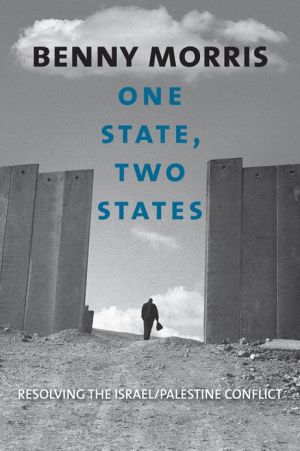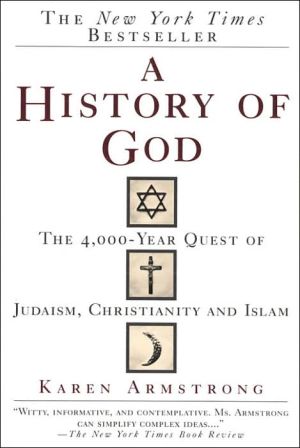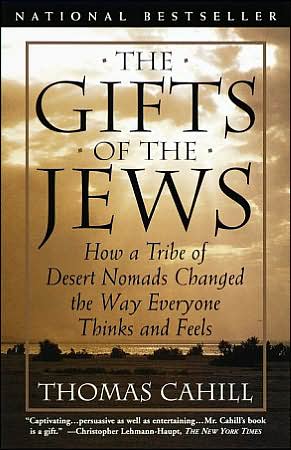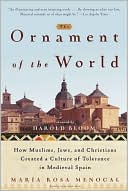One State, Two States: Resolving the Israel/Palestine Conflict
“What is so striking about Morris’s work as a historian is that it does not flatter anyone’s prejudices, least of all his own,” David Remnick remarked in a New Yorker article that coincided with the publication of Benny Morris’s 1948: A History of the First Arab-Israeli War. With the same commitment to objectivity that has consistently characterized his approach, Morris now turns his attention to the present-day legacy of the events of 1948 and the concrete options for the future of Palestine...
Search in google:
"What is so striking about Morris's work as a historian is that it does not flatter anyone's prejudices, least of all his own." David Remnick remarked in a New Yorker article. With the same commitment to objectivity that consistently characterizes his approach, Morris now turns his attention to the present day legacy of the events of 1948 and the concrete options for the future of Palestine and Israel.One State, Two States scrutinizes the history of the goals of the Palestinian national movement and the Zionist movement, then considers the various one- and two-state proposals made by different streams within the two movements. It also looks at the willingness or unwillingness of each movement to find an accommodation based on compromise. Morris assesses the viability and practicality of proposed solutions in the light of complicated and acrimonious realities. Throughout his groundbreaking career, Morris has reshaped understanding of the Israeli-Arab conflict. Here, once again, he arrives at a new way of thinking about the discord. Commentary "gloomy, concise, and spot-on"—Commentary
One State, Two States\ Resolving the Israel/Palestine Conflict \ \ By Benny Morris \ YALE UNIVERSITY PRESS\ Copyright © 2009 Benny Morris\ All right reserved.\ ISBN: 978-0-300-12281-7 \ \ \ Chapter One\ The Reemergence of One-Statism \ Palestinian Arab Islamic fundamentalists, of the Hamas and Islamic Jihad varieties, have always advocated the elimination of Israel and a one-state-a Muslim Arab state-solution for the Israel/Palestine problem. But over the past few years, Palestinian Arab intellectuals linked to the mainstream Fatah Party and living in the West have also begun talking openly about the desirability, or at least the inevitability, of a one-state solution-one state between the Jordan River and the Mediterranean, inhabited by both Arabs and Jews. This marks a break from their at least superficial espousal during the 1990s of a two-state solution and a reversion to the openly enunciated policy of the Fatah and Palestinian Liberation Organization in the 1960s and 1970s, as embodied in the Palestinian National Covenant, which posited the elimination of the Jewish state and the establishment in its stead of an Arab-dominated polity encompassing the territory of Israel and the (at present) semioccupied West Bank and Gaza Strip.\ For many of these "Western" Palestinians, this represents nothing more than an emergence from the closet. In fact, these current one-staters never really identified with theFatah's professed advocacy in the 1990s of a two-state solution, with a partitioned Palestine divided into two states, one Jewish, the other Arab, living side by side in peaceful coexistence. Like their cousins in Palestine, both inside Israel and in the West Bank and Gaza Strip, and in the main concentrations of the Palestinian diaspora-Jordan, Lebanon, and Syria-they had always believed, and continue to believe, that all of Palestine belongs to them, the Palestinian Arabs; that a Jewish state in any part of Palestine is illegitimate and immoral; and that, in the fullness of time, the whole country will eventually revert to Arab sovereignty. But the Western-American and European-governmental two-state mantra and the PLO's apparent adoption of two-statism in the late 1980s and early 1990s forced them underground or into a duplicitous advocacy of, or reluctant acquiescence in, the two-state formula.\ Now these Arab one-staters-the "all of Palestine is ours" advocates-are surfacing once again, loudly proclaiming the truth and justice of their cause. Ghada Karmi, a British Palestinian activist, perhaps heralded the trend with her article (albeit published in Arabic, in 2002) "A Secular Democratic State in Historic Palestine: An Idea Whose Time Has Come?" The question mark is misleading: the piece is quite emphatic about the unacceptability (to the Palestinians), indeed, death, of the two-state paradigm and the ineluctability of the one-state solution. She suggests that it might begin with "a formal policy of binationalism" that "may even ultimately pave the way to the secular democratic state in historic Palestine." (I shall return to the "secular democratic state" formula later.)\ More significant still is Palestinian American historian Rashid Khalidi's admittedly cagey though ultimately unambiguous exposition of the one-state position in The Iron Cage (2006). He maintains in this book that his exposition does not "involve advocacy." But even a minimally perceptive reader will not miss where his heart and mind lie.\ He writes: "Among some observers ... a realization has been growing for years that this outcome [that is, a two-state solution] is increasingly unlikely. This realization has taken shape irrespective of the merits or demerits in principle of the two-state solution, in spite of the long-standing desire of majorities of Palestinians and Israelis for their own state, and notwithstanding the (often grudging and hedged) acceptance by each people of a state for the others ... In this view, the inexorable cementing of Israel's hold over the occupied West Bank and East Jerusalem has rendered moot the possibility of establishing what could legitimately be called a Palestinian state [alongside Israel] ... This is the case if a 'Palestinian state' is taken to mean a viable, contiguous, sovereign, independent state on the territory of the 22 percent of mandatory Palestine constituted by the Palestinian territories occupied by Israel in June 1967." This realization has "instigated renewed consideration of the old idea of a one-state solution, as either the ideal outcome or as the most likely default outcome, for Palestine/Israel." According to Khalidi, some see this one-state denouement as the "inevitable outcome of the extension into the immediate future of current trends ... [These trends, amounting to] inexorable creeping de facto annexation [by Israel] of the West Bank and East Jerusalem, ... will produce what is in effect a single sovereign Israeli-dominated polity throughout Palestine, with either rough Arab-Jewish demographic parity or, more likely, an eventual Arab majority. In this scenario, some feel, in time it will prove impossible to keep the two peoples in one tiny land segregated, or to keep that polity Jewish-dominated, as it eventually became impossible to keep South Africa white-dominated."\ Khalidi adds: "There is little reflection among those who hold this [one-state] conception about the future constitutional structure or political arrangements between the two peoples . . . Similarly, there is little consideration of how it would be possible in such a single state to overcome either the apparent desire of both peoples for independent statehood, or the deep and abiding distrust of each collectivity toward the other."\ According to Khalidi, there is another group of one-staters whose thinking is a "throwback to the old Palestinian idea of a single unitary state of Palestine ... [either] in terms of the previous PLO conception of a secular, democratic state in all of Palestine with equal rights for all ... [or] in terms of an Islamic state in which non-Muslims would be tolerated minorities."\ A last group of one-staters, according to Khalidi's definitions, are those who advocate "a binational approach ... [that] would take into account ... [the] two national realities within the framework of one state." Khalidi acknowledges that all the onestate approaches have not taken real account of the "stone wall" of Israeli and American rejection of the dismantling of the Jewish state and run counter to the international warrant of legitimacy for Jewish statehood (and Palestinian Arab statehood) issued by the UN General Assembly partition resolution (number 181) of November 1947.\ The precipitants to this newfound candor about the desirability, or at least the inevitability, of a single state between the Mediterranean Sea and the Jordan River (and often the assertion of "inevitability" is mere camouflage for the propagation of its "desirability") are three: PLO chairman Yasser Arafat's rejection of the two-state solution proposed in July and again in December 2000 by Israeli prime minister Ehud Barak and US president Bill Clinton, his rejection providing political impetus and cover for the in-principle subversion of two-statism; the rise of the openly rejectionist, one-statist Hamas to primacy in Palestinian Arab politics, as epitomized in the movement's general election victory of January 2006 and its violent takeover of the Gaza Strip in June 2007; and, last, the recent advocacy of a one-state solution by a coterie of non-Arab Western intellectuals, spearheaded by Tony Judt, a distinguished professor of modern European history at New York University, against the backdrop of the Second Intifada and, more pertinently, the Islamic world's assault on the West, epitomized by 9/11 (and stretching, geographically, from the southern Philippines and southern Thailand through India, Afghanistan, and the Middle East to Madrid and London). I would like to focus for the moment on this third precipitant.\ In 2003 Judt, who has never worked academically on the Middle East, published "Israel: The Alternative" in the New York Review of Books. This article can be seen at once as the harbinger and first blossom of this newborn one-statism among certain segments of the Western intelligentsia. For Palestinian one-staters, it was a public relations coup. It placed the one-state idea-or in Judt's view, "ideal"-buried, in effect, since the late 1940s, squarely and noisily on the table of international agendas.\ Judt's arguments were fairly simple: the idea of Israel, as of ethnic nationalism in general, had (partly due to the Yugoslav wars of the 1990s) lost traction and was no longer adequate to underpin the continued existence of, and support for, a Jewish state. We are living "in an age" that rejects the idea of a state in which "one community-Jews-is set above others." The Jewish state, he argued, had been established "too late," "a characteristically late-nineteenth-century separatist project" superimposed on "a world that has moved on, a world of individual rights, open frontiers, and international law." Judt implied that, at least intellectually, the nation state was dead and "the very idea of a 'Jewish state' ... rooted in another time and place ... is an anachronism ... [in] a world where nations and peoples increasingly intermingle and intermarry ...; where cultural and national impediments to communication have all but collapsed; where more and more of us have multiple elective identities ...; in such a world Israel is truly ... [a] dysfunctional [anachronism]."\ To this overarching, principled contention Judt added a second, of a more practical turn: the Israeli-Palestinian Oslo peace process of the 1990s, based on an assumed ultimate outcome of two states, had died, essentially because of Israeli obstructionism, and could not be resurrected. There could and would be no partition of Palestine/Israel into two states. And the demographic facts on the ground, given the Arabs' far greater birth rate, as well as the current demographic reality of Israel's Jewish population of 5.4 million and 1.3 million Arabs and the West Bank-Gaza Strip's combined population of 3-3.8million Arabs-the exact number is in dispute-mean that Israel can not long remain both Jewish and democratic.\ Within a decade or two, continued Judt, there would be more Arabs than Jews between the Jordan and the Mediterranean. (Indeed, Haifa University geographer Arnon Sofer has argued that by 2020 the total population between the Jordan River and the Mediterranean will reach 15.5 million, with only 6.4 million of them being Jews and most of the rest, 8.8 million, being Arab, creating a binational reality, albeit with a substantial Arab majority. The Palestinian Arab birthrate is the highest in the world. The natural increase among Palestinian Muslims is estimated at 3 percent per annum; among Israel's Arab minority and the West Bank Palestinian population, it stands at 3.1 percent; among southern Israel's bedouin population it is 4.5-5 percent; and among the Gaza Strip Arabs it stands at 3.5-4 percent per annum. By comparison, in 2006 Egypt's annual population increase was about 2 percent, in Turkey 1.3 percent, and in Iran 1.2 percent. Israel's overall natural increase in 2007 stood at 1.5 percent.) If Israel-the Jews-still ruled the whole of Palestine, they would either have to throw out all or most of the Arabs to assure the polity's Jewish majority and nature or institute an apartheid regime of Jews lording it over a disenfranchised Arab majority, something Israeli society would most likely abhor. Neither of these options, geared to maintaining the Jewishness of the state, was realistic, argued Judt.\ The only other alternative was for Israel to withdraw from the territories and facilitate the emergence in the West Bank and Gaza Strip of a Palestinian Arab state, which would allow Israel to remain both (largely) Jewish and democratic. But this could not and would not happen, said Judt; it is "too late for that." There were "too many settlements [and] too many Jewish settlers." The 400,000 Israeli settlers implanted in the territories since 1967 will not agree to live in a Palestinian Arab state, and no Israeli leader will have the guts, or political power, to forcibly uproot, abandon, or crush them, as David Ben-Gurion back in 1948 had crushed the dissident right-wing Jewish militias, the IZL (Irgun Zvai Leumi, or National Military Organization, which the British Mandate authorities called the "Irgun") and LHI (Lohamei Herut Yisrael, or Freedom Fighters of Israel, which the British Mandate authorities called the "Stern Gang"). The political, ideological, and economic trauma of such an uprooting, which could result in a Jewish civil war, would be too great for Israel to bear. Hence, it will not happen.\ So what was the solution? According to Judt, it was "a single, integrated, binational state of Jews and Arabs, Israelis and Palestinians." And this, Judt rhetorically opined, was not just "increasingly likely" but also "actually a desirable outcome." After all, "most of the readers of this essay live in pluralist states which have long since become multiethnic and multicultural." He pointed to "London," "Paris," and "Geneva" as such pluralist milieus.\ Judt, himself a Diaspora Jew, owned up that one of his motives in this advocacy was that "non-Israeli Jews feel themselves once again exposed to criticism and vulnerable to attack for things they didn't do [that is, Israel's behavior in the occupied territories]. But this time it is a Jewish state, not a Christian one, which is holding them hostage for its own actions." "The depressing truth," Judt told his readers, "is that Israel today is bad for the Jews."\ The practicalities of turning Israel/Palestine into a binational state did not trouble Judt overmuch. It "would not be easy, though not quite as impossible as it sounds," he suggested. And the United States and the international community could help. An "international force" could guarantee "the security of Arabs and Jews alike," and anyway, "a legitimately constituted binational state would find it much easier policing militants of all kinds inside its borders."\ Judt's article elicited a tidal wave of responses, most of them negative. An exception was Amos Eilon, an Israeli journalist and historian who recently decamped to a villa in Tuscany. He waded in with a few paragraphs of support ("Judt should be lauded," he wrote)-though he added, tellingly, that should a binational state with an Arab majority materialize, "the end result is more likely to resemble Zimbabwe than post-apartheid South Africa."\ But most of the responses published by the New York Review of Books were extremely critical of Judt's piece, not to say thoroughly dismissive. Omer Bartov, a historian of Israeli origin at Brown University, wrote that the author was "strangely wrongheaded" and seemed to be writing from the perspective of "a café in Paris or London." Compared to which nation state was "Israel an anachronism"? Compared to Syria or Saudi Arabia or Iran? And if the comparison was to modern Europe, surely Poland and Serbia were equally anachronistic because they, too, are "based on a unity ... of nation and state." Judt seemed to prefer, for Israel/Palestine, the model of interwar Poland, with its diverse populations, "rife with ethnic conflict and anti-Semitism." Or Yugoslavia, "which [recently] broke up in a sea of blood." For Judt, these (unsuccessful) multiethnic models apparently were preferable to (peaceful) uniethnic nation-states.\ In any event, according to Bartov, the binational model for Israel/Palestine is "absurd" because neither Israeli Jews nor Palestinian Arabs want it. Both groups seek to live in a country inhabited and governed by their own. On the Arab side, the Islamic fundamentalists regard shared sovereignty with the Jews as "anathema," and the moderates know that "a binational state ... would spell civil war and bloodshed on an unprecedented scale." Two states, perhaps even separated by an ugly security fence, is a better idea by far, he concluded.\ Michael Walzer, a political thinker at the Institute for Advanced Study in Princeton, took the ideological bull by the horns when he wrote: "Ridding the world of the nation-state is an interesting, if not a new, idea. But why start with Israel? Why not with France? ... The French led the way into this parochial political structure that, in violation of all the tenets of advanced opinion, privileged a particular people, history, and language ... Or [with] the Germans, or the Swedes, or the Bulgarians ... all of whom have enjoyed these 'privileges' much longer than the Jews."\ (Continues...)\ \ \ \ \ Excerpted from One State, Two States by Benny Morris Copyright © 2009 by Benny Morris. Excerpted by permission.\ All rights reserved. No part of this excerpt may be reproduced or reprinted without permission in writing from the publisher.\ Excerpts are provided by Dial-A-Book Inc. solely for the personal use of visitors to this web site. \ \
Acknowledgments viiMaps viiiList of Abbreviations XV1 The Reemergence of One-Statism 12 The History of One-State and Two-State Solutions 283 Where To? 161Notes 203Bibliography 223Index 230
\ Commentary"gloomy, concise, and spot-on"—Commentary\ \ \ \ \ Magill's Literary Annual 2010"A rich and persuasive account of just how deep-seated and historically rooted the antagonism is between Israelis and Palestinians."--Ira Smolensky, Magill''s Literary Annual 2010\ — Ira Smolensky\ \ \ \ Magill's Literary Annual 2010"A rich and persuasive account of just how deep-seated and historically rooted the antagonism is between Israelis and Palestinians."—Ira Smolensky, Magill's Literary Annual 2010\ \ \ \ \ New Yorker"What is so striking about Morris''s work as a historian is that it does not flatter anyone''s prejudices, least of all his own."—David Remnick, New Yorker\ — David Remnick\ \ \ \ \ \ TruthDig.com“I urge you, in the strongest terms, to read ‘One State, Two States.’ . . . I very much hope that it will ignite a freer, more honest, radically different conversation on the left, one informed by historical knowledge and current realities rather than the fantasies—alternately sentimental, infantile and grandiose—for which such a high price has been paid by all sides.”—Susie Linfield, TruthDig.com\ — Susie Linfield\ \ \ \ \ \ Choice"Morris details the various proposals for a "one-state" or "two-state" solution to the conflict that should have followed the UN General Assembly division of the territory and termination of the [British Mandate]. In a final chapter, he considers correctly that neither solution is practical or realistic. The best option, he feels, would be a West Bank-Gaza-Jordan confederation with Israel. . . . Recommended."—W. Spencer, Choice\ — W. Spencer\ \ \








